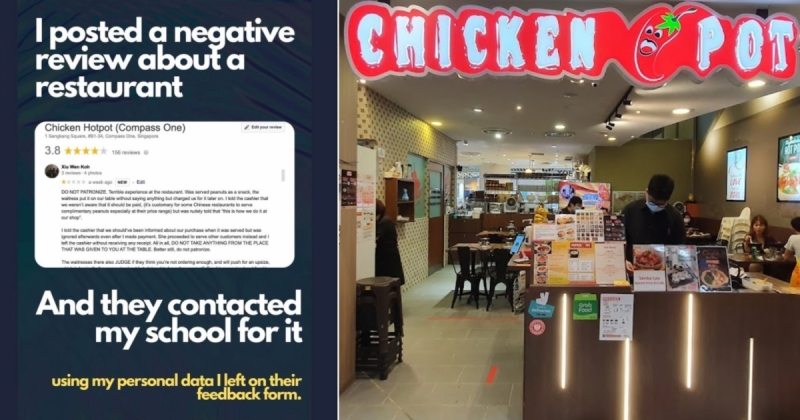Criticism: How Far Do We Go From Here?
 image credit: Mothership SG
image credit: Mothership SG
Reviews are important to us as part of the F&B industry. It can be a litmus test to the amount of service that the establishment offers, and helps us improve and do better. Yet, there have been situations where reviews of customer experience can make things ugly for both the customer and the F&B establishment, and a lot of public opinion falls between the different camps to lay blame and attribute what could have been done better.
This can be seen no more aptly than the recent case where a young woman wrote a negative review of Chicken Pot, where she had dined with her friends and had been charged for a small serving of peanuts that were served, which the customer had thought complimentary. She had also written about having bad service from one of their waitresses as well. Having posted the feedback form using her university email address from National University of Singapore, she had then proceeded to post her experiences on her Instagram and DouYin page.
That review, in that case, backfired on her: days later, the university's IT department called to ask if she had made a negative review because the company had called the university to highlight the student's negative review. The woman had concluded that it was a move from the restaurant to pressure her into taking the review down if she didn't want her academic life at NUS affected and questioned if this was an ethical practice seeing as they had seen the domain of the email address, taken her personal details from the email and made a complaint.
The restaurant, Chicken Hotpot, had in recent days released their own statement on the matter, to show their side of the situation, and in a way, it's a very cringeworthy one that was agreed by a large number of commentators to be a rather bad one. This included the use of CCTV camera to show pictures of the diner (which had not been disputed by the original poster), and the justification of calling the school to verify and question the review as there was a theory it was a scam.
The entire situation between Chicken Hotpot and the reviewer has brought up a point of contention that should be addressed: what does one do with negative feedback and reviews, especially once placed on social media and on review sites like Google Reviews and Instagram? Is it possible that in defending our companies and our establishments, we in turn miss the forest for the trees? In many situations, how we react to feedback is a missive of humility and the need to improve, and we have to exercise our sense of pride and defensiveness when we get criticism of this manner.
We have to make sure that we always look at feedback and treat it as having a grain of truth, as well as salt: while the customer probably has a point from an unsatisfactory part of their experience, why must we then take the experience as an, "all or nothing" situation, where you either have to have extremely good reviews?
 image credit: Mothership SG
image credit: Mothership SG